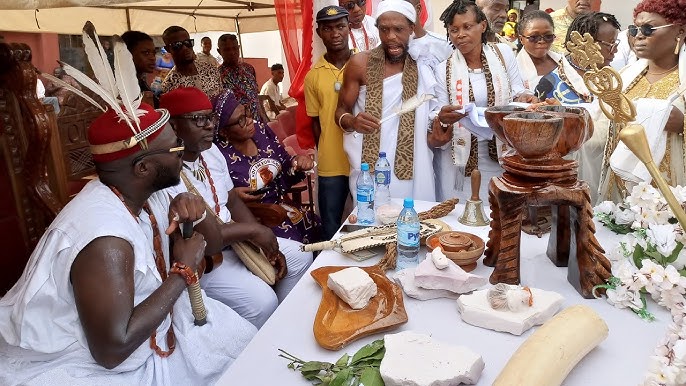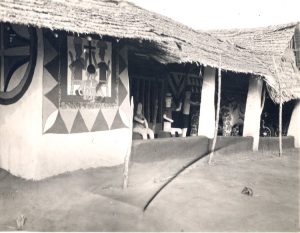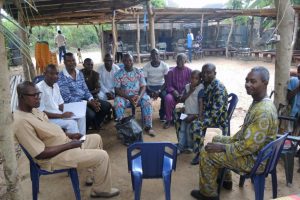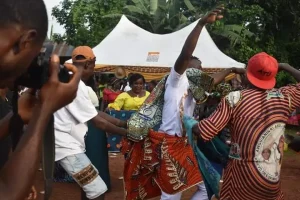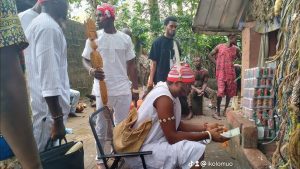Justice, truth, and morality are profoundly entwined in Igbo society with religious and spiritual convictions. The Ofo, a holy staff or rod signifying power, justice, and the will of the ancestors, is among the most important emblems reflecting these beliefs. An integral part of Igbo spirituality and community life is the custom connected with the Ofo, often referred to as Igu Ofo. Invoking the power of the Ofo to swear oaths, make pronouncements, and seek divine intervention, Igu Ofo is The importance of Igu Ofo in Igbo society, the symbolism of the Ofo itself, the technique of performing Igu Ofo, and its applicability in modern society are investigated in this paper.
The Symbolism of Ofo
More than simply a physical item, the Ofo is a potent emblem of justice, honesty, and the moral authority placed in the leaders and elderly people of the society. Made from the branches of the Detarium senegalense tree, the Ofo links the wearer to the divine by supposedly carrying the spirit of the ancestors and the gods. Usually handed down from generation to generation, its ownership signifies the continuance of moral and spiritual leadership within a family or society.
Considered a living being gifted with spiritual power is the Ofo. It is utilized to support justice and fairness and reflects the shared consciousness of the society. Considered to guard against evil and bestow benefits onto people who are moral, the Ofo also represents protection. Within Igbo cosmology, the Ofo is a necessary instrument for mediation, dispute resolution, and the preservation of societal order as it links the physical and spiritual worlds.

The Process of Igu Ofo
Inviting the might of the Ofo to give witness to truth, dispense justice, and seek the blessings or wrath of the gods is the custom known as Igu Ofo. Igu Ofo is a highly ceremonial practice requiring the presence of the Ofo holder—usually an elder or spiritual leader with the power to use the Ofo. Often taking place in the framework of major events like resolving conflicts, swearing oaths, making pronouncements of importance, or requesting divine intervention in issues of public relevance is the ritual.
The Igu Ofo rite starts with the elder or priest clutching the Ofo stick in their palm. Speaking gravely, the individual carrying out the custom asks the gods and ancestors to observe the events. Then the Ofo, which stands for the link between the sky and the ground, is either held aloft or directed towards the earth. The words said in Igu Ofo have considerable weight as they are supposed to be binding in the spiritual as well as the physical worlds.
When taking an oath, for instance, the individual can affirm their innocence or honesty while carrying the Ofo, therefore calling the ancestors to punish them should they be lying. The Igu Ofo ceremony is performed in times of dispute resolution to call the divine to expose the truth and guarantee that justice is done. The ritual is a potent weapon for guaranteeing that justice rules as the Ofo is considered as an impartial arbitrator incapable of supporting dishonesty or injustice.
Igu Ofo in Conflict Resolution
The Igu Ofo custom is fundamental in traditional Igbo culture in terms of administration of justice and dispute settlement. Whether over property, inheritance, or another issue, the elders or priests often turn to Igu Ofo to ask divine judgment when conflicts develop. Knowing that the repercussions of dishonesty or dishonesty might be severe, the trust in the spiritual power of the Ofo guarantees that all the participants approach the rite with respect and sincerity.
The custom is especially successful in cases where there is no obvious proof to settle a conflict. The elders call upon the Ofo to seek the assistance of the ancestors and gods thereby exposing the truth. The Igu Ofo ceremony combines the temporal and the eternal in the search of justice, therefore acting both legally and spiritually. It emphasizes the need of honesty and integrity in public life as the dread of divine punishment inhibits dishonesty.
Sometimes the Ofo is used to curse someone who has seriously violated the principles of the community or its standards. Unless the perpetrator confesses and atones, this curse is said to bring about disaster or disease. This kind of application of Ofo emphasizes its function as a defender of moral order and social peace, therefore guaranteeing that those who violate are answerable.
Igu Ofo and Social Order
Apart from its contribution to dispute resolution, Igu Ofo is also very helpful in preserving social order and supporting shared values. Important public occasions such the appointment of a new leader, the resolution of community conflicts, or the announcement of communal legislation are often the setting for the custom, which Invoking the Ofo, the community shows its shared will to preserve justice, truth, and righteousness.
By guaranteeing that people follow the accepted values and practices of the society, the Igu Ofo ceremony also acts as a social control tool. One strong deterrent against immoral activity is the dread of bringing the wrath of the ancestors or gods by using Ofo under wrong usage. People’s awareness is profoundly embedded with this terror, hence the Igu Ofo ceremony is a useful instrument for preserving moral rectitude and discipline.
The Igu Ofo ceremony is a public event held in traditional Igbo culture usually in front of the whole community. The public character of the ritual emphasizes its importance as a community event in which the people’s collective will lines up with the spiritual authority of the ancestors. Seeing Igu Ofo together helps to build the ties of community and guarantee that the ideals it supports will be carried on to next generations.
Igu Ofo in Contemporary Igbo Society
Igu Ofo’s importance has endured into modern times even as Igbo culture has changed dramatically. Although contemporary faiths and legal systems have changed many facets of traditional life, the Igu Ofo rite is still a significant cultural and spiritual event. In rural regions, where traditional norms are more firmly ingrained, the Ofo and the Igu Ofo rite still centralize communal life.
Though it is less common in urban areas and among the Igbo diaspora, the Igu Ofo ceremony has symbolic significance. Regardless of their theological background, many Igbo people see the Ofo as a representation of their moral principles and cultural legacy. < Often used as a means of upholding custom and strengthening community ties, the ritual is performed for major family or group events such weddings, funerals, or dispute settlement.
Furthermore, in recent years ancient Igbo religious and cultural activities have attracted increasing attention. This has resulted in a fresh respect of the Igu Ofo custom and its part in preserving moral and social order. Scholars and cultural groups have sought to protect and advance the tradition so that subsequent generations would know its importance.
Conclusion
A pillar of Igbo society, the Igu Ofo ceremony reflects moral integrity, fairness, and truth, therefore strengthening the principles. Seeking direction and protection in their everyday life, the Igbo people connect with their ancestors and the supernatural by means of the Ofo invocation. Essential to dispute resolution, social order, and the maintenance of community values, the ritual is central to Igbo spiritual and cultural life.
The Igu Ofo ceremony is still a potent emblem of Igbo identity and history notwithstanding the changes brought about by urbanization and the impact of different faiths. Its ongoing significance in modern culture emphasizes the ongoing need of spirituality and moral power in determining the way of life of the Igbo people. Serving as a living legacy, Igu Ofo guarantees that the principles it promotes will be handed on to next generations by bridging the past with the present.
Please read all our stories on African Culture here
